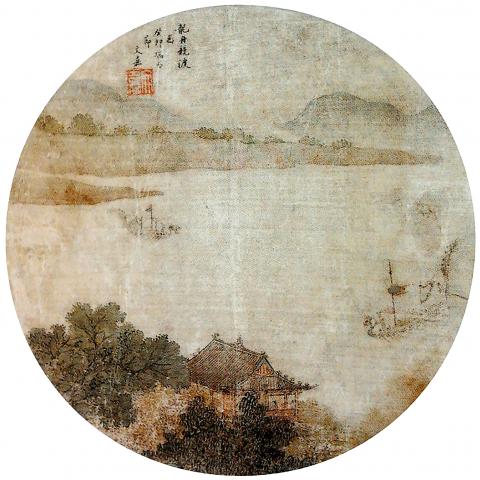Chinese Practice
以毒攻毒
(yi3 du2 gong1 du2)

Photo: Wikimedia Commons
照片:維基共享資源
treat poison with poison
今天是端午節,英文俗稱Dragon Boat Festival,端午節是在每年農曆五月初五。傳統中醫遵循陰陽五行的原則──結合「五味」、「五穀」、「五聲」、「五色」以及「五毒」等──對中醫來說,端午節是非常重要的一天。端午節這天被認為是一年之中陽氣最盛、火氣最旺的特殊日子,因此是一年中採集與煉製陽性、火性草藥的最佳時刻。據信在這一天採擷使用的成分特別有療效。
中醫傳統上認為有毒的成分可能對治療某些毒或疾病最為有效。因此,端午節傳統上被認為是捕捉某些有毒生物──蠍、蛇、蜈蚣、蟾蜍、蜘蛛──作為藥用的最佳時間。
表達使用毒來治療其他毒的「以毒止毒」一語,是受到上述中醫原則所啟發,首次見於《北山錄》,為中唐學者及僧侶神清所著。隨著時間的推移,「以毒止毒」演變為成語「以毒攻毒」:用毒藥來對抗毒藥。這成語的意義可以是字面上的,如同傳統中醫原則;它也可以用作比喻,表示採用一種惡毒的策略,來對付另一個同樣惡毒的策略,或反制攻擊你的惡毒之人。
「fight fire with fire」(以火治火)是和成語「以毒攻毒」意義類似的英文說法,這句話也運用了「以某物對抗某物」這簡單的語言結構。在用法上,它指的是由於情況所需,而採取比通常的做法更為極端的手段。例如,面對諷刺言語的攻擊,有人可能會用更加刻薄的諷刺來回應。因你並不是發起攻擊的人,所以你可以為自己的粗魯辯解說,你只不過是以同樣的方式回敬對方。
這句話的由來,卻是出自實際用來撲滅野火的策略。
森林野火是肇因於人為因素或是雷擊。野火若發生在人口密集地區,會造成災難性的破壞,雖然野火可能是對當地生態環境有益的。對野火的積極預防措施包括「back burning」(防火線開闢)──在容易起火的區域預先把易燃物燒掉,以形成防火線,因此野火未來將沒有東西可燒,火勢就不會進一步蔓延;以及「back firing」(引火回燒),即故意燃起火焰,並引導火焰走向即將到來的野火,以期能夠阻止野火的走勢。
「fight fire with fire」這句話,顯然是來自十九世紀美國移民的打火方法。
(台北時報林俐凱譯)
這項醫學研究計畫採取「以毒攻毒」的方法,以流感病毒的基因來對抗流感。
(This medical research seeks to use the principle of fighting fire with fire, using flu genes to fight flu.)
美國校園槍擊案頻傳,擁槍派鼓吹的解決方式是以毒攻毒,主張讓教師配槍。
(With the increased numbers of school campus shootings in the US, there have been calls to arm teachers and to fight fire with fire.)
英文練習
fight fire with fire
Today is the Duanwu Festival, popularly known as the Dragon Boat Festival. It is held every year on the fifth day of the fifth month of the lunar calendar. In traditional Chinese medicine, which observes the principles of yin-yang and five elements theory — incorporating the “five flavors,” the “five grains,” the “five sounds,” the “five colors” and the five toxins” — this is a very significant day. It is regarded as the day in the year that the yang principle reaches its apogee, and when the “internal heat” principle is at its lowest ebb, and is seen as the optimal time of the year to collect ingredients high in the yang and internal heat elements and to make medicinal preparations from them. It was believed that ingredients collected and used on this particular day would be especially efficacious.
Traditionally, Chinese medicine also holds that ingredients that were inherently toxic themselves could be the most effective in the treatment of certain toxins or diseases. For this reason, the Duanwu Festival was also traditionally thought to be the best time to catch certain poisonous creatures — scorpions, snakes, centipedes, toads and spiders — for medicinal use.
The phrase expressing the idea of using toxins to treat other toxins — 以毒止毒 (to use poison to stop poison) — first appears in the beishan lu (The Beishan Records) by the mid-Tang Dynasty scholar/monk Shenqing, and was inspired by the aforementioned medical principle. Over time, 以毒止毒 evolved into the idiom 以毒攻毒: to fight poison with poison. This could be taken literally, as with the medical principle. It could also be used figuratively, to mean employing a vicious tactic to counter a similarly vicious tactic, or indeed a particularly noxious person, attacking you.
Like 以毒攻毒, the potential English equivalent, to “fight fire with fire,” uses a simple formula of employing like against like. In usage, it means utilizing means more extreme than perhaps one would normally do, due to the demands of the situation. One might, for example, counter a sarcastic verbal attack by responding with — generally even more caustic — sarcasm. Because you were not the one who initiated the attack, you could defend your rudeness by saying that you were only reacting in kind.
The origins, however, come from the practice of actually fighting fire with fire, as part of a basket of wildfire suppression tactics.
Wildfires in areas of forest or woodland are started either by human hand or lightning strikes. While potentially beneficial to the local ecology, they can be devastating when they occur in populated areas. Proactive preventive measures include back burning — where a firebreak is created by preemptively burning inflammable material in a vulnerable area, so a future wildfire will be starved of fuel and not be able to proceed further — or backfiring, where a fire is intentionally ignited and directed toward an encroaching wildfire, in the hope of halting its progress.
The phrase apparently originated in the 19th century in America, from the fire-fighting practices of US settlers.
(Paul Cooper, Taipei Times)
If they’re going to spread vicious rumors about us, we will just have to fight fire with fire, and spread rumors about them.
(如果他們要散播對我們不利的謠言,我們就只要以毒攻毒,也來散播他們的謠言。)
I think, rather than fighting fire with fire, you should do the opposite, and just turn the other cheek. That will confuse them.
(我想,與其以牙還牙,你不如採取相反的策略,繼續挨打,這樣反而會讓他們陷入困惑。)

A: While Taylor Swift’s new album conquers the Billboard charts, Billboard Live Taipei is set to open next month. B: Isn’t that a Japanese “live house” of the same name with the magazine? A: Yup, and the live music club’s first Taiwanese branch can accommodate 300 guests. B: Who will be performing at the club’s opening show? A: Japanese singer Mika Nakashima will play four gigs over two nights. Wanna go to the club and watch her perform up-close? A: 天后泰勒絲的新專輯再度征服《告示牌》排行榜,告示牌音樂台北則預計將在下月開幕。 B: 那不是跟《告示牌》同名的日本現場音樂餐廳嗎? A: 對,這家連鎖餐廳的台灣首店約可容納300名觀眾! B: 開幕秀的表演者是誰? A: 是日本歌手中島美嘉,想近距離看她現場演出嗎? (By Eddy Chang,

In his famous tragic play Romeo and Juliet, the English playwright William Shakespeare wrote, “What’s in a name?” As it turns out, there is quite a lot in a name, particularly a surname, which is commonly known as a person’s last name in Western societies. A surname is written after the first name, which is also referred to as a given name or, traditionally, a Christian name. A closer look at the history of surnames reveals some fascinating insights into their origins. It may come as a surprise to some that up until about 1,000 years ago, surnames were

Rehearsal time is over. The world’s best and most ambitious young pianists have descended on Warsaw for the Frederic Chopin International Piano Competition — for some, a gateway to classical music glory. Fans from around the globe snapped up tickets as much as a year ago. The lucky ones attended the opening night concert on Oct. 3 and will follow along as the contest builds to a thrilling climax on Oct. 20. Winning the Chopin International — held every five years in the 19th-century composer’s homeland — can raise the curtain to playing at venues across the globe and signing contracts

Continued from yesterday(延續自昨日) https://www.taipeitimes.com/News/lang While many early surnames in England were strongly influenced by the work people did, like Carpenter or Plumber, jobs were not the only factor. Physical characteristics, personal nicknames, geographical locations and even parents’ first names also played a role. It’s not hard to imagine how the color of a person’s hair could have led to a surname like “Redhead” or “White,” while a darker complexion might have resulted in the last name “Black.” Meanwhile, someone known as a quick runner might have earned the surname “Swift,” while a clever or cunning individual could have been called “Fox”